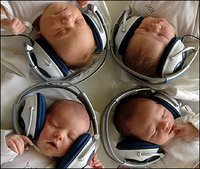Neural Oscillations and the Mozart Effect
 Nearly 10 years ago, a group of psychologists made the astonishing claim that listening to classical music improves people's mathematical and spatial reasoning skills. While not limited to humans (even rats showed IQ increases) it is sometimes limited to certain types of music or certain situations: everything from Mozart to Philip Glass has been tested for beneficial effects in situations ranging from IQ testing to invasive surgery. The 250th anniversary of Mozart's birthday seems like a suitable time to review the evidence on what has been called "the Mozart effect": for whom, and in what situations does music have any positive effect?
Nearly 10 years ago, a group of psychologists made the astonishing claim that listening to classical music improves people's mathematical and spatial reasoning skills. While not limited to humans (even rats showed IQ increases) it is sometimes limited to certain types of music or certain situations: everything from Mozart to Philip Glass has been tested for beneficial effects in situations ranging from IQ testing to invasive surgery. The 250th anniversary of Mozart's birthday seems like a suitable time to review the evidence on what has been called "the Mozart effect": for whom, and in what situations does music have any positive effect?In some ways, the Mozart effect seems like a diverse and robust finding. Six-year-old children who are given keyboard or voice lessons have shown a reliable 2 to 3 point increase in IQ scores compared to control groups who received other types of artistic lessons. Pre-schoolers with two years of music lessons scored better on spatial reasoning tests than those who took computer lessons for the same time. And as little as 10 minutes of exposure to Mozart's Sonata for Two Pianos in D Major resulted in a temporary enhancement of spatial-temporal reasoning on the Stanford-Binet IQ test. These and other studies lend credence to experimental pedagogical methods (like the Kodaly method), and have inspired a flurry of commercial interest, from the sale of "Mozart Effect" cds to the formation of the Music Intelligence Neural Development (MIND) Institute, which claims to be able to dramatically increase standardized test scores.
 However, there's plenty of reason for skepticism. Not everyone who has attempted to replicate these results has been able to do so - perhaps music only has certain effects for specific populations. Some hold that the effect of such music is only to elevate arousal and mood, which then results in improved performance and well-being in a variety of situations. And if true, the Mozart effect is one of the few examples of an extremely rare phenomenon known as 'far transfer,' in which experience with one domain (music) can transfer benefits to a completely distinct domain (spatial reasoning). Still, the variety of reported results remains alluring: Mozart has also been shown to allow some with Alzheimer's disease to function more normally, to reduce the severity of epileptic seizures, and even to lessen the need for sedatives in surgery relative to no music or white noise.
However, there's plenty of reason for skepticism. Not everyone who has attempted to replicate these results has been able to do so - perhaps music only has certain effects for specific populations. Some hold that the effect of such music is only to elevate arousal and mood, which then results in improved performance and well-being in a variety of situations. And if true, the Mozart effect is one of the few examples of an extremely rare phenomenon known as 'far transfer,' in which experience with one domain (music) can transfer benefits to a completely distinct domain (spatial reasoning). Still, the variety of reported results remains alluring: Mozart has also been shown to allow some with Alzheimer's disease to function more normally, to reduce the severity of epileptic seizures, and even to lessen the need for sedatives in surgery relative to no music or white noise.
Some of these effects are also evident from computational models of the brain, which often result in neural assemblies forming characteristic firing rhythms. According to Shaw's book, "Keeping Mozart In Mind," he and graduate student Xiaodan Leng transformed their models' activity into music, and noticed patterns closely resembling several different musical styles. This finding motivated the first "Mozart Effect" study, conducted by Shaw and Rauscher: if neural networks fire in patterns that are related to music, perhaps musical experience can help improve their function.
Like most things related to biology, the whole story is not so clear cut. While babies show diverse abilities to recognize novel rhythms, this skill remarkably deteriorates within the first few years of life, just as infants' ability to discriminate phonemes deteriorates as they acclimate to their culture's phonography. So if music does affect the spatio-temporal patterns of neural networks, it could well be limited to specific rhythms. And if musical experience is unequivocally good for children, it seems puzzling that autistics show remarkably enhanced tone memory and discrimination relative to their peers.
Related Posts:
Neural Network Visualization
Review: Everything Bad is Good For You
Synchrony vs Polychrony
Tuned and Pruned: Synaesthesia
If you liked this, don't forget to digg it.


2 Comments:
Hi - sorry for the delayed response! I didn't see your comment for some reason. I'm not very familiar with music therapy, but I think these findings are pretty recent, so it may be that music therapy is driven by intuition or another earlier study with which I'm not familiar.
I know that I use music therapy - "the girl and the sea" by the presets has been very effective lately :)
Nice summary. I just saw a "smarter baby" CD being distributed to new moms as a promo by a commercial firm (baby formula maker?) Mozart & similar... Hey, even if it doesn't raise the baby's IQ, it beats heavy metal for nursery music.
Post a Comment
<< Home